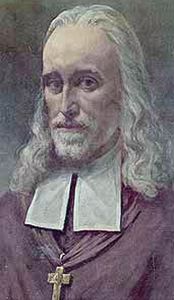|
|
|




 Oliver PLUNKETT Oliver Plunkett (or Plunket) was born into a wealthy and influential Anglo-Norman/Irish family, who supported King Charles I ( Bonny Prince Charlie)in his fight for national freedom. He was born on 1 November 1625 at Loughcrew, near Oldcastle, Co Meath. In 1647, he travelled to Rome to study with the Jesuits at the newly established Irish College in Rome,. He was ordained a priest on January 1, 1654 in the Propaganda College in Rome. Due to religious persecution in his native land, it was not possible to return straight away. To avoid Oliver Cromwell's persecution of Catholic priests, Plunkett petitioned to remain in Rome,and from 1654 until 1669 he was became a Professor of theology at the Irish College.  Oliver PLUNKETT with Crest Ring In time anti-Catholicism eased in Ireland, and in 1669 Oliver Plunkett became the Procurator for Irish bishops, and the Archbishop of Armagh, Ireland. He set about reorganising the ravaged Church. While he was the Primate of all Ireland, he established the Jesuits in Drogheda, where they ran a school for boys, and a college for theology students, a need he saw as great because the clergy were in his opinion 'ignorant in moral theology and controversies'. He also tackled drunkenness among the clergy, writing 'Let us remove this defect from an Irish priest, and he will be a saint.' Perhaps that is why the area named after him, which has more pubs than any other in a small space, needs his patronage.  Oliver PLUNKETT His ministry extended to Gaelic speaking Catholics of the highlands and the isles of Scotland. Because of the oppression of Catholics, he was forced to conduct a covert ministry during the suppression of priests. Once again persecution reared its ugly head in 1673 so Oliver Plunkett went into hiding for a time, refusing a government edict to register at a seaport and await passage into exile. In 1678, the so-called Popish Plot concocted in England by Titus Oates led to further anti-Catholicism, and Oliver Plunkett again went into hiding. Rumours were rife, and the privy council in London was told that he had plotted a French invasion.  Oliver PLUNKETT In December 1679, Oliver Plunkett was imprisoned in Dublin Castle. He was arrested and tried at Dundalk in 1679 for conspiring against the state by plotting to bring 20,000 French soldiers into the country, and for leveling a tax on his clergy to support 70,000 men for rebellion. Lord Shaftesbury knew that Oliver would never be convicted in Ireland, and had him moved to Newgate prison, London. The first grand jury found no true bill, but he was not released. The second trial was a kangaroo court; Lord Campbell, writing of the judge, Sir Francis Pemberton, called it a disgrace to himself and his country. In June, 1681 Oliver Plunkett was found guilty of high treason, largely on perjured evidence from two disaffected Franciscans, "for promoting the Catholic faith," and was condemned to a gruesome death on Tyburn Gallows.  Hogarth's Painting of the Tyburn Gallows He was found guilty of high treason and executed on 1 July 1681. He was 51 years of age. Oliver Plunkett became the last Catholic martyr to die for his faith at Tyburn when he was hanged, drawn (disembowelled) and quartered (cut in four pieces). His body was initially buried in two tin boxes next to five Jesuits who had died before; his head is in Saint Peter’s Church at Drogheda, Ireland; most of his body is at Downside Abbey, England at Tyburn Convent, London; and some relics in Ireland.  Oliver Plunkett's head He was beatified in 23rd May, 1920 by Pope Benedict XV at Rome, Italy and canonised on 12th October, 1975 by Pope Paul VI. He was the first new Irish saint for almost seven hundred years. |
